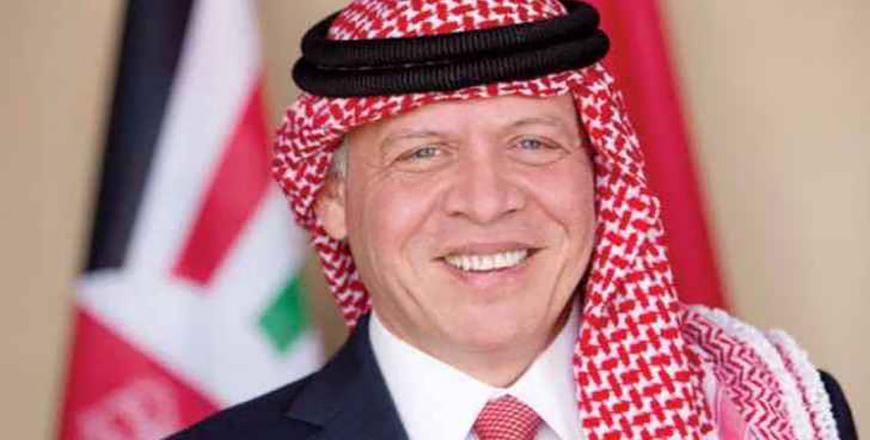You are here
King in Washington Post op-ed: It’s time to return to globalisation. But this time let’s do it right
By JT - Apr 28,2020 - Last updated at Apr 28,2020

AMMAN -- The Washington Post published an op-ed by His Majesty King Abdullah on Tuesday headlined “It’s time to return to globalisation. But this time let’s do it right”.
Following is the op-ed:
“I can’t remember the precise context, but I was recently taken aback when an aide mentioned I had become the longest-serving Arab leader. The sheer pace and density of events in the past 21 years—wars, terrorist attacks, regional conflicts, waves of refugees, financial crises—had caused the years to blur together.
Just when I thought I could give myself permission to start saying I’d seen it all, along came the novel coronavirus.
I cannot recall a time when every leader on the planet had the exact same item at the top of his or her agenda. This captures how truly surreal this moment in history is. But common concern does not necessarily translate into coordinated action.
It has been reassuring to see the global medical community working to share information as doctors and researchers hunt for a cure. Yet there is no denying that this border-blind enemy appeared just when the term “de-globalisation” was entering our lexicon—thanks to the rise of nationalism, protectionism and general scepticism about cross-border cooperation of all kinds.
Yes, we’ve seen moments in the past two decades when humanity rallied together in common grief, fear or outrage. We all distinctly recall that dark day when the planes struck the twin towers in New York, launching a new age of terrorist insanity. Many countries have their own experiences of trauma seared into their memories: hotels in Amman, an arena in Manchester, a girls’ school in Nigeria, a concert in Paris, mosques in New Zealand, churches in Sri Lanka, synagogues in the United States, and many others. No matter how far away each incident was, the grief always felt personal.
Yet the moments of unity inspired by these events—and the financial crises and natural disasters we’ve also faced over the years—have never lasted long enough to push us to fundamentally rethink the systems we have in place. More often than not, our responses have done little more than plug holes, falling far short of what could be achieved with modern technology.
In the Middle East, we realised that we had to take a different approach in the fight against terrorism. We knew that our only hope for defeating it depended on breaking down barriers—both among nations as well as among the institutions within them. Jordan understood the need for a joint platform to enhance coordination among regional and international stakeholders, and so we launched the Aqaba Process to enable all partners to counter extremism and terrorism by leveraging resources, sharing information, identifying gaps and avoiding redundancies.
Today, our world has decided to turn warning sign to siren. Unlike previous threats, this one is hitting us all, and all at once. This crisis has thrown a harsh light on the gaps in our global order—gaps caused by social injustice, income inequality, poverty and misgovernance.
Many are optimistic we will simply rebuild after this pandemic. But rebuilding is not enough. We should focus instead on creating something new, something better.
Instead of “de-globalisation”—as some are advocating—I see us all benefiting from a “re-globalisation.” This time, though, we must concentrate on getting it right, aiming for a renewed integration of our world that centres on the well-being of its people. A re-globalisation that strengthens and builds capacities within our countries and ushers in true cooperation rather than competition. A re-globalisation that recognises that a single country, acting alone, cannot succeed. One country’s failure is every country’s failure.
That means recalibrating our world and its systems. We need to reconfigure international institutions and build new ones where needed. We need to create and sustain new organisations that draw on the skills and resources of different sectors, across national boundaries. Jordan is ready to build on its experience with the Aqaba Process to help in any way it can. Threats do not come in silos, and the solutions cannot be in silos.
This rings especially true in my corner of the world. As Arab nations, we have no choice but to act together to mitigate the impact on us all. The natural resources we had relied on to shield us are no longer enough. We must set aside our differences and recognise that yesterday’s rivalries are meaningless against this shared threat. We need to leverage the strengths and resources of each of our countries to create a regional safety net that protects our collective future.
Unemployment, famine and poverty lie ahead if we do not act. We must address the global opportunity gap, including access to health care, and rethink the models and metrics employed by international financial agencies in emerging markets to better tell the whole story.
Covid-19 is a threat that confronts every leader. But if we wish to defeat it, we must do what seems counterintuitive: Put politics and popularity aside. We must also do the exact opposite of what the doctor ordered: Come together and get to work. To face this single threat, we must have singular focus—the survival and well-being of human lives everywhere.”
Related Articles
AMMAN — Her Majesty Queen Rania penned an op-ed for The Washington Post, published on Thursday, on the tragic losses in Gaza and the urgency
His Majesty says leaders everywhere have the responsibility to face full reality of this crisis, as ugly as it is‘If the status quo continue
AMMAN — His Majesty King Abdullah on Tuesday participated in the 75th Session of the United Nations General Assembly, held virtually for the

















